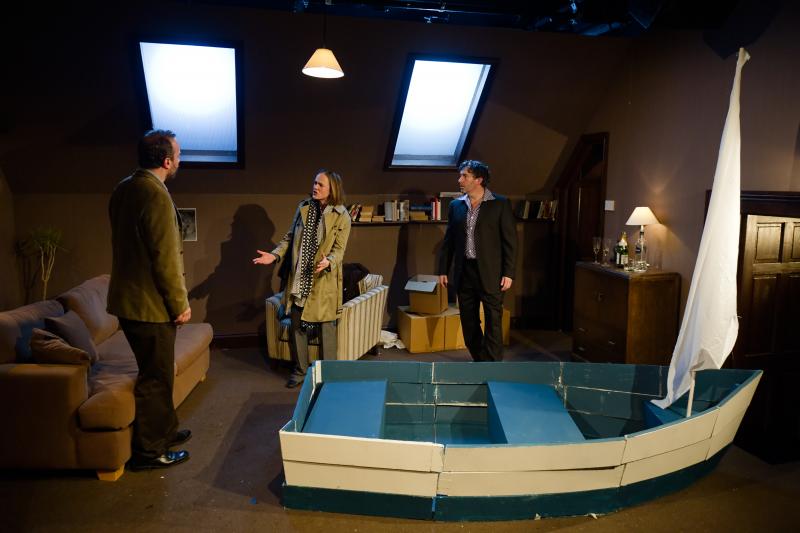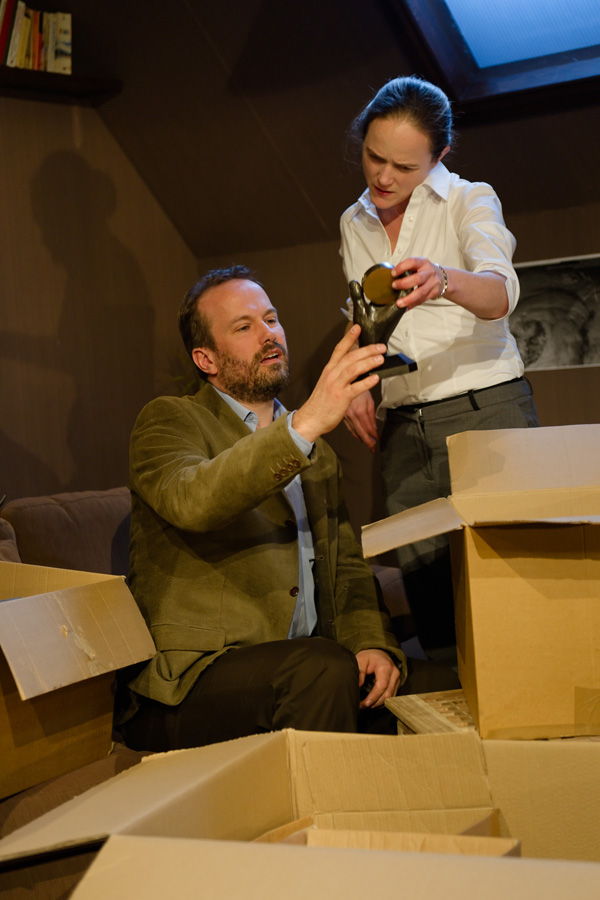Mathematics of the Heart, Theatre 503 | reviews, news & interviews
Mathematics of the Heart, Theatre 503
Mathematics of the Heart, Theatre 503
A new drama about the randomness of desire is well acted but lite on plot

Science rocks. In the theatre, this is a subject that offers to provide powerful experiments in metaphor. Most recently, in Nick Payne’s Constellations - and most classically in Tom Stoppard’s Arcadia, Michael Frayn’s Copenhagen and Charlotte Jones’s Humble Boy - the world of quantum mechanics, cosmology and chaos theory suggests ideas about the randomness of our daily lives. And there is nothing quite so random as love.
In the appealingly titled Mathematics of the Heart, Dr Paul MacMillan – a bearded boffin from Middlesex University – has a problem. He is a professor of chaos theory, and his specialism is storm patterns, but he is taken aback when it rains. And other aspects of his life seem equally difficult to predict. His father, who was a mathematician more eminent than his son, has just unexpectedly died, and his brother, the aptly named Chancer, is occupying the spare room of his flat.
Can Paul cope with his father’s legacy?
At the same time, his girlfriend Emma, a 38-year-old solicitor, is finding it difficult to get Paul to commit. Her biological clock is ticking. She doesn’t share his flat and, at the start of the play, comes over and is surprised to find Paul with Zainab, a twentysomething PhD student who looks stunningly attractive. But Emma doesn’t have to worry; Paul’s head is in the clouds. Things only begin to hot up when Chancer, a rangey, reggae-loving free liver and loafer, decides to make a move on Zainab.
Set in Paul’s London flat, the story playfully begins with Paul and Emma opening the biggest of several boxes of his father’s possessions. It contains a build-it-yourself blue boat. It is a symbolic legacy, which evokes Paul and Chancer’s childhood, and it also sets a challenge. Will Paul, who has no skill at handicrafts, be able to construct it? Can he cope with his father’s legacy? How will Emma react to life with a boat?
Kefi Chadwick’s finely written play, which was acclaimed on its first outing at the Brighton Fringe Festival last year, is basically a study of sibling rivalry, with a vivid contrast between the brainy Paul and the more earthy Chancer. The one is lost in abstract intellectual pursuits while the other is grounded in more bodily functions. Delightfully, Chancer is part of a band; he likes to rock and is definitely a ladies' man. But, in this conflict between two brothers, both behave as schoolboys; both remain in the shadow of their dead father.
 In what is a story of emotional storms, the science metaphors occasionally glow like a bright star in a cloudless sky; at other times the main thrust of the evening is naked emotion. Feelings of love run rings around reason, and words prove less than adequate to reconcile lifelong conflicts which burst their scabs and bare their scars. Meanwhile, the boat metaphor is grounded in solid wood – a vessel that is built and unbuilt in front of our eyes – and feels more resonant, summoning up ideas about fathers, family and childhood adventure.
In what is a story of emotional storms, the science metaphors occasionally glow like a bright star in a cloudless sky; at other times the main thrust of the evening is naked emotion. Feelings of love run rings around reason, and words prove less than adequate to reconcile lifelong conflicts which burst their scabs and bare their scars. Meanwhile, the boat metaphor is grounded in solid wood – a vessel that is built and unbuilt in front of our eyes – and feels more resonant, summoning up ideas about fathers, family and childhood adventure.
In the end, the plot doesn’t quite feel strong enough to avoid the shallows of treacherous metaphor, with ideas about numerology, double pendulums and ships in bottles coming fast and fluently. Yet, for once, I felt that the drama should have been longer, been given more room to breathe beyond its 95 minutes. Still, there is much that is delightful in director Donnacadh O’Briain’s spirited production, which includes an actor playing Paul’s subconscious and a stage manager who helps out on stage. Some of the boat building is a bit slow, but the acting is uniformly excellent.
Mark Healy’s serious and repressed Paul (pictured above right with Isabel Pollen) contrasts beautifully with Mark Cameron’s freewheeling, extroverted Chancer, while Isabel Pollen’s efficient but needy Emma and Bella Heesom’s bubbly and bright Zainab are both just right. Signe Beckmann’s solid design and Philip Stewart’s evocative soundscape give Chadwick’s story of conflicted human hearts a touch of magic. Maths was never this much fun at school.
rating
Buy
Explore topics
Share this article
The future of Arts Journalism
You can stop theartsdesk.com closing!
We urgently need financing to survive. Our fundraising drive has thus far raised £49,000 but we need to reach £100,000 or we will be forced to close. Please contribute here: https://gofund.me/c3f6033d
And if you can forward this information to anyone who might assist, we’d be grateful.

Subscribe to theartsdesk.com
Thank you for continuing to read our work on theartsdesk.com. For unlimited access to every article in its entirety, including our archive of more than 15,000 pieces, we're asking for £5 per month or £40 per year. We feel it's a very good deal, and hope you do too.
To take a subscription now simply click here.
And if you're looking for that extra gift for a friend or family member, why not treat them to a theartsdesk.com gift subscription?
more Theatre
 Get Down Tonight, Charing Cross Theatre review - glitz and hits from the 70s
If you love the songs of KC and the Sunshine Band, Please Do Go!
Get Down Tonight, Charing Cross Theatre review - glitz and hits from the 70s
If you love the songs of KC and the Sunshine Band, Please Do Go!
 Punch, Apollo Theatre review - powerful play about the strength of redemption
James Graham's play transfixes the audience at every stage
Punch, Apollo Theatre review - powerful play about the strength of redemption
James Graham's play transfixes the audience at every stage
 The Billionaire Inside Your Head, Hampstead Theatre review - a map of a man with OCD
Will Lord's promising debut burdens a fine cast with too much dialogue
The Billionaire Inside Your Head, Hampstead Theatre review - a map of a man with OCD
Will Lord's promising debut burdens a fine cast with too much dialogue
 50 First Dates: The Musical, The Other Palace review - romcom turned musical
Date movie about repeating dates inspires date musical
50 First Dates: The Musical, The Other Palace review - romcom turned musical
Date movie about repeating dates inspires date musical
 Bacchae, National Theatre review - cheeky, uneven version of Euripides' tragedy
Indhu Rubasingham's tenure gets off to a bold, comic start
Bacchae, National Theatre review - cheeky, uneven version of Euripides' tragedy
Indhu Rubasingham's tenure gets off to a bold, comic start
 The Harder They Come, Stratford East review - still packs a punch, half a century on
Natey Jones and Madeline Charlemagne lead a perfectly realised adaptation of the seminal movie
The Harder They Come, Stratford East review - still packs a punch, half a century on
Natey Jones and Madeline Charlemagne lead a perfectly realised adaptation of the seminal movie
 The Weir, Harold Pinter Theatre review - evasive fantasy, bleak truth and possible community
Three outstanding performances in Conor McPherson’s atmospheric five-hander
The Weir, Harold Pinter Theatre review - evasive fantasy, bleak truth and possible community
Three outstanding performances in Conor McPherson’s atmospheric five-hander
 Dracula, Lyric Hammersmith review - hit-and-miss recasting of the familiar story as feminist diatribe
Morgan Lloyd Malcolm's version puts Mina Harkness centre-stage
Dracula, Lyric Hammersmith review - hit-and-miss recasting of the familiar story as feminist diatribe
Morgan Lloyd Malcolm's version puts Mina Harkness centre-stage
 Reunion, Kiln Theatre review - a stormy night in every sense
Beautifully acted, but desperately grim drama
Reunion, Kiln Theatre review - a stormy night in every sense
Beautifully acted, but desperately grim drama
 The Code, Southwark Playhouse Elephant review - superbly cast, resonant play about the price of fame in Hollywood
Tracie Bennett is outstanding as a ribald, riotous Tallulah Bankhead
The Code, Southwark Playhouse Elephant review - superbly cast, resonant play about the price of fame in Hollywood
Tracie Bennett is outstanding as a ribald, riotous Tallulah Bankhead

Add comment